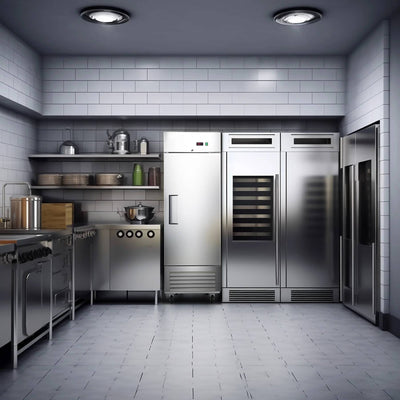The decision to equip your commercial space with home appliances might seem like a cost-saving measure. However, when it comes to the heart of your operations – food storage – this choice can be a costly mistake. Commercial refrigerators and freezers are specifically designed to meet the demands of high-volume, continuous use, offering benefits that far outweigh the initial investment.

I. Commercial Kitchens: The Fridge Factor
Running a commercial kitchen is no walk in the park. Between juggling orders, managing staff, and ensuring food safety, there’s a lot on your plate. And let's not forget the constant battle with your fridge.
Imagine this: your kitchen is in full swing, orders are piling up, and suddenly, your fridge decides to take a break. Or maybe it's struggling to keep up with the demand, causing food to spoil and costing you money. Sound familiar? These are the everyday headaches that commercial kitchen owners and managers face.
Let’s break down the common fridge-related frustrations:
· Frequent breakdowns: Your fridge is supposed to be a reliable workhorse, not a drama queen. Constant breakdowns can throw your entire kitchen out of whack.
· Temperature troubles: Food safety is paramount, and a fridge that can't maintain a steady temperature is a recipe for disaster (literally).
· Storage space blues: Running out of fridge space is like trying to fit a square peg in a round hole. It's frustrating and inefficient.
· Energy vampires: A fridge that guzzles electricity is a nightmare for your bottom line.
· Cleaning chaos: Keeping a fridge clean in a busy kitchen is a battle in itself.
It's time to ditch the fridge frustrations and upgrade to a commercial-grade unit that can handle the heat (literally). We’ll dive deeper into the benefits of commercial fridges

II. Built for the Grind: Durability and Performance
Commercial kitchens are bustling environments with constant demands. Residential appliances, not designed for this rigour, can quickly falter. Commercial refrigerators, on the other hand, are built to last:
· Robust Construction: Commercial units feature stronger hinges, handles, and materials to withstand frequent opening and closing.
· Powerful Performance: Equipped with larger compressors, they cool faster, maintain consistent temperatures, and preserve food quality better.
· Hygiene-Focused Design: Commercial refrigerators are easier to clean and sanitize, meeting stringent food safety standards.
Beyond durability, commercial refrigerators are tailored to the unique needs of businesses:
· Spacious Interiors: Designed to accommodate large quantities of food and beverages.
· Flexible Configurations: Available in various sizes and styles to fit different spaces and needs.
· Energy Efficiency: Built to minimize energy consumption, reducing operational costs.
In essence, commercial refrigerators are engineered to endure the rigors of a professional kitchen, while offering features that optimize food storage and preservation for businesses.

III. Choosing the Perfect Fridge
Selecting the optimal commercial refrigerator is crucial for any foodservice establishment. Here's a breakdown of key factors to consider:
1. Assess Your Business Needs
- Capacity: Determine the amount of food storage required based on your menu and customer volume.
- Type of Food: Consider the specific types of food you'll be storing (e.g., meat, dairy, produce) to select appropriate temperature zones.
- Space Constraints: Measure your kitchen layout to determine the available footprint for the refrigerator.
- Energy Efficiency: Evaluate energy consumption to manage operating costs.
2. Select the Right Type of Refrigerator
- Reach-in Refrigerators: Ideal for smaller spaces and frequent access.
- Walk-in Refrigerators: Suitable for large-scale storage and bulk items.
- Undercounter Refrigerators: Perfect for limited countertop space.
- Display Refrigerators: Showcase products while keeping them chilled.
3. Prioritize Performance and Durability
- Temperature Control: Ensure precise temperature regulation to maintain food safety.
- Construction Quality: Look for sturdy materials and construction to withstand heavy use.
- Refrigerant Type: Choose environmentally friendly and energy-efficient refrigerants.
- Door Seals: Verify the quality of door seals to prevent energy loss and temperature fluctuations.
4. Consider Additional Features
- Shelving and Organization: Opt for adjustable shelves and dividers for efficient storage.
- Energy Efficiency Ratings: Look for ENERGY STAR certified models to reduce operating costs.
- Cleaning and Maintenance: Consider ease of cleaning and accessibility for maintenance.
- Warranty: Evaluate warranty coverage for protection against defects.
Investing in the right commercial refrigerator is crucial for your business's success. By carefully considering factors like capacity, performance, and energy efficiency, you can find the perfect equipment to meet your needs. Smad Commercial Equipment offers a wide range of high-quality commercial refrigeration solutions designed to enhance your operations. With their commitment to durability, efficiency, and customer satisfaction, Smad is an excellent choice for businesses seeking reliable and long-lasting equipment.

